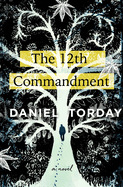
In his third novel, The 12th Commandment, Daniel Torday (Boomer1; The Last Flight of Poxl West) marries an intriguing murder mystery to an exploration of the power of charismatic religious leaders and an inquiry into aspects of Kabbalistic thought. It's an ambitious project, but he's clearly done his homework and has the self-assurance to execute the task he's set for himself with both substance and style.
Ezekiel (Zeke) Leger, a New York writer and editor with a national magazine, returns to the small Central Ohio town of Mt. Izmir, where he attended college, for the funeral of one of his classmates who's taken his own life. But that sudden death is not the only puzzle that will consume him. Almost simultaneously with his arrival, he hears about the murder of Osman Fritzman, the 16-year-old son of the leader of a sect that blends Jewish and Muslim practices in a nearby rural enclave. The leader, who goes by the name Natan of Flatbush and claims prophetic powers, has been convicted of the crime, in a prosecution led by Zeke's ex-lover, Johanna Franklin. Natan awaits the outcome of his appeal in prison. Once Zeke persuades a skeptical editor to greenlight an investigation into the sect and the murder, he must overcome the initial resistance of the religious community--known as the Caves--to allow access to an outsider.
Though Torday, a two-time winner of the National Jewish Book Award for fiction, brings the mystery of Osman's death to an appropriate conclusion, it's clearly subordinate in importance to the story of Natan and his followers. As long as there are fervent believers, some will strive to transcend the boundaries of conventional faith. Only time and circumstance determine how their quest will end. --Harvey Freedenberg, freelance reviewer

